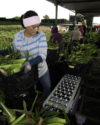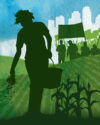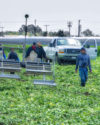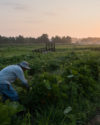
Who, What, and How Much Is Essential?
Blog | Tony VanWinkle | Jun 22, 2020
Every other year I teach a course titled, “Security, Sovereignty, and Justice in the Global Food System” at a small,…
A global wave of land and water grabs is concentrating farmland and other food producing resources in the hands of a few, with serious consequences for both rural and urban communities. For an introduction to this issue, download our Food First Issue Primer on Land & Resources

Every other year I teach a course titled, “Security, Sovereignty, and Justice in the Global Food System” at a small,…

The following is a special edition, eight-page Backgrounder covering the experiences and insights from farmers and farmworkers during the COVID-19…

On Tuesday, June 2nd, Food First’s M. Jahi Chappell was joined by Raj Patel, Ahna Kruzic, and Jim Goodman to…

The world is currently bearing witness to a unique historical moment. Profound and catastrophic environmental, economic, and health crises are…

The following is an excerpt from our upcoming, special edition Backgrounder on COVID-19 and the food system. The COVID Crisis…

This article was originally published at Foreign Policy in Focus by Food First Fellow, Walden Bello. The global food system…

The following is the first article from our newest series, Lessons from Australia’s Bushfires. This series will focus on the voices,…

This book review was originally published at the Journal of Agriculture, Food Systems, and Community Development. Download the PDF here…

What does it look like when activist-scholars, embedded in academic institutions that foster a culture of individualism and competition, work to collectivize their efforts and support social movements fighting for systemic change?

How can agroecology be advanced, amplified, scaled up and out? In each context, there are enabling and disabling conditions that shape the potential for agroecology to be scaled. This Food First Issue Brief identifies six ‘domains of transformation’ that are essential to consider in agroecology transformations.

Thirty years ago many banana workers in the Philippines made a radical change in their work and lives. They transformed the militant unions they had organized to wrest a decent living from the multinational corporations that control much of the world’s food production. Instead of working for wages, they used the country’s land reform law to become the owners of the plantations where they had labored for generations.

This article was originally published at Small Farm Future. Time for me to arise from my book-editing duties and offer…